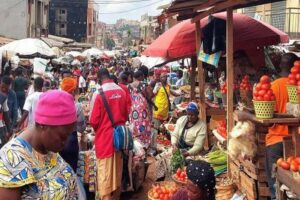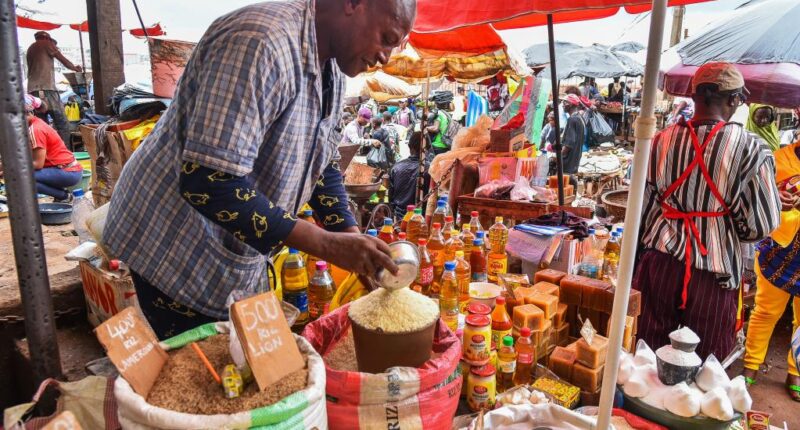Since the tense presidential contest and the widespread unrest that followed the October 12, 2025, vote, households across La République du Cameroun have found themselves grappling with sudden, steep increases in the prices of basic foodstuffs and household essentials. Rice, tomatoes, cooking oil, sugar, beans, garri, and cooking gas—items that form the backbone of most Cameroonian diets—have seen dramatic price spikes, squeezing family budgets already stretched thin by inflation and slow wage growth.
Traders, market women, and consumers in major urban centres report that the normal flow of goods has been repeatedly interrupted over the past weeks. Shortages of staple items have pushed retail prices well above pre-election levels: rice, often imported and sensitive to transportation costs, is cited as especially affected; perishables such as tomatoes are rotting in transit when roads are blocked, pushing prices up at city markets; and processed staples — sugar and cooking oil — have experienced supply shortages that amplify price volatility for the average household.
Public sources and market observers link the spike in food prices to two principal, interacting causes: disruptions to transport and wholesale supply chains stemming from protests and road blockages, and heavy-handed attempts by authorities to control retail prices by pressuring wholesalers. In several commercial hubs, wholesalers reported being summoned or threatened with administrative sanctions — including the public suggestion that licences could be revoked — if they failed to reduce marked prices. Such interventions have, in many cases, only added to market uncertainty: wholesalers respond by restricting supplies, raising prices to hedge risk, or diverting stock to informal channels where risks of confiscation and fines are lower.
The blockade of the Bafoussam road corridor, one of the main arteries connecting the north and western production zones with southern and coastal markets, has been particularly damaging. Farmers in the northern and central agricultural belts depend on these routes to reach city markets in Douala, Yaoundé and Buea. Where convoys are stopped, harvests cannot be moved quickly; perishable produce like tomatoes and green vegetables are lost, while dry staples face delays and increased transport costs. The compounded effect is scarcity in consumer markets and higher wholesale markups to cover longer, more dangerous routes and added logistical costs.
Market analysts warn that the situation is likely to worsen should opposition calls for a “ghost town” or nationwide general strike, such as those reportedly encouraged by opposition candidate Issa Tchiroma Bakary, take effect. A ghost-town day halts urban commerce, keeps trucks from moving, and deters buyers from markets. In an economy where a large share of staples travels regionally by road rather than by rail or refrigerated logistics, even one or two extended ghost-town days can lead to significant supply interruptions and persistent price pressure for weeks afterwards.

The human impact of these price shocks is immediate and severe. Low-income households, who spend a far higher share of their income on food, are forced to switch to cheaper caloric substitutes, reduce meal frequency, or cut out more nutritious items like legumes and oil. Small entrepreneurs — roadside eateries, market vendors, and informal transporters — face collapsing margins and declining demand. School feeding programmes, hospital canteens and other social services struggle to reconcile fixed budgets with rapidly rising procurement costs.
Policy responses to date have been blunt and contradictory. Public statements urging calm and promising legal action against price gouging sit alongside reports of intimidation of wholesalers. Economists argue that punitive measures — threats to revoke licences or public shaming of traders — can backfire: rather than increasing supply, such measures often induce hoarding, reduce the willingness of private actors to import or move stock into volatile areas, and drive trade underground, where prices become opaque and harder to regulate.
What is needed is a dual approach that addresses short-term shortages while stabilising markets in the medium term. Immediate measures that would help include targeted fuel and transport subsidies for food convoys on designated “humanitarian” corridors; temporary waivers or expedited clearance for essential food imports; the creation of transparent, public price-monitoring dashboards; and secure, mediated dialogues between government authorities, wholesale associations and market unions to establish temporary, voluntary supply agreements rather than resorting to threats. Longer term, investments in resilient logistics — cold chains, diversified routes and public grain-reserve mechanisms — will reduce the country’s vulnerability to episodic political unrest.
The unfolding cost-of-living crisis is not merely an economic problem: it is a political and humanitarian one. When citizens cannot afford rice or cooking gas, social tensions deepen and political polarisation hardens. All stakeholders — ruling institutions, opposition leaders, civil society and the international community — bear a responsibility to prevent economic shocks from becoming protracted humanitarian emergencies. In practical terms, that means prioritising corridors for food movements, protecting market actors willing to cooperate, and tempering rhetoric that threatens the commercial lifelines households depend on.
Cameroon’s resilience will be tested by how the next weeks unfold. If road blockades persist and calls for mass shutdowns intensify, households will continue to shoulder rising bills and declining food security. Conversely, a rapid, coordinated response that keeps markets moving and restores predictability could arrest the worst price surges and prevent temporary scarcities from becoming long-term deprivation. For now, ordinary Cameroonians remain the immediate victims of a political moment whose economic aftershocks will be felt at the kitchen table.





